|
|
|
Sort Order |
|
|
|
Items / Page
|
|
|
|
|
|
|
| Srl | Item |
| 1 |
ID:
187309
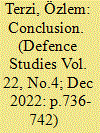

|
|
|
|
|
| Summary/Abstract |
This concluding piece to the Special Issue on Interpolarity: Revisiting Security and the Global Order focuses on the concept of interpolarity as both a conceptual tool to understanding multipolar interdependencies and as an approach aiming to change the nature of multipolarity from one of rivalry and contestation toward one of cooperation in the face of global challenges. It engages with the question: To what extent is overcoming the tension between these poles a dilemma between interpolarity being a desirable goal and being a normative compromise on the values these poles want to uphold in the international arena? After presenting both sides of the dilemma, this piece concludes that an “interpolar” approach to conceptualizing International Relations (IR) can facilitate a more inclusive and comprehensive approach toward a truly global study of IR.
|
|
|
|
|
|
|
|
|
|
|
|
|
|
|
|
| 2 |
ID:
187306
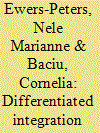

|
|
|
|
|
| Summary/Abstract |
An extensive size of literature has investigated the multifaceted dimensions of differentiated integration in Europe. Notwithstanding, we know little about the drivers and strategic underpinnings of differentiated integration in the high politics areas concerning national and international security, such as foreign policy, security and defence. What explains the variation in states’ foreign policy preferences of integration in multilateral security orders? In this article, we seek to explain this variation by putting forward a two-level argument. First, we claim that states adopt a genuine role player conception underpinned by a mixture of relative gains, absolute gains, and normative factors. Second, we propose a novel operational model to examine member states’ efforts for cooperation and integration in the security and defence domain based on their threat perceptions, level of ambitions, strategic partnerships, military spending, and troop deployments. To illustrate our argument, we employ a comparative case study design, examining four countries: Germany, France, Ireland and Romania. The article finds that the analysed countries play conspicuous roles in the Euro-Atlantic security order. France takes the role of an agile power-projector, Germany embraces the role of a global responsibility taker, Ireland plays the role of a peacekeeping neutral, and Romania of a small regional power.
|
|
|
|
|
|
|
|
|
|
|
|
|
|
|
|
| 3 |
ID:
187302


|
|
|
|
|
| Summary/Abstract |
European strategic autonomy has become a common motto since the EU’s Global Security Strategy (2016). France and Germany have for several years been playing a leading role in promoting the concept even though they share quite different views on what such autonomy should aim for, especially in a context of multipolarity and power re-configurations. This article analyzes the role of French-German input in European strategic autonomy relying on two criteria: input legitimacy (procedures) and output legitimacy (efficiency). Based on three concrete examples (the MPCC, PESCO, and the European Strategic Compact), the article explores the French-German input in developing European autonomous military tools and capabilities and seeks to explain the legitimacy of this input based on factors such as the historical legacy of French-German military cooperation and the use of political symbolism. Then the article focuses on the question of the efficiency (output) of this bilateral input in European strategic autonomy. The main advantage of this approach is its explanatory power to capture the hiatus between the strong output legitimacy that Paris and Berlin bring into European strategic autonomy and its rather limited empirical output produced. This hiatus can be explained by strategic cultural divergences between Paris and Berlin.
|
|
|
|
|
|
|
|
|
|
|
|
|
|
|
|
| 4 |
ID:
187305
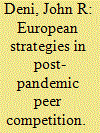

|
|
|
|
|
| Summary/Abstract |
The recent reconceptualization of national and/or defense strategies, hangovers from the sovereign debt crisis, and the impact of the pandemic-induced recession in four of the most powerful European countries – France, Germany, Italy, and the United Kingdom – will have profound implications for the United States. Through Republican and Democratic administrations, most American political leaders, experts in academia and think tanks, and other opinion leaders in the media and elsewhere have consistently held that Europe is vital to American national security. This is particularly true during an era of great power competition, as the United States works to prevent China’s authoritarian governance system and its statist economic model from becoming dominant. Given recent changes in the grand strategies of America’s most important European allies and their shifting abilities to fulfill those strategies, Washington will have an increasingly difficult time fulfilling its own goals and objectives. American strategy relies on European allies for competition with near-peers as well as defense of the global commons and projection of hard and soft power overseas to favorably influence events. Shifting capabilities, capacity, and will within Europe – all framed within evolving European strategies – will make it difficult for Washington to rely on its allies.
|
|
|
|
|
|
|
|
|
|
|
|
|
|
|
|
| 5 |
ID:
187301
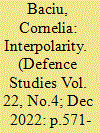

|
|
|
|
|
| Summary/Abstract |
This Introduction to Special Issue (SI) seeks to provide a corrective dimension to unipolar and multipolar understandings of global order by proposing to integrate several levels of analysis. It seeks to introduce a different understanding of the contemporary world order. To this end, it first develops a new theoretical model of world order, putting forward the concept of interpolarity. Interpolarity is understood as the interaction between multiple interdependent poles of different sizes. The main utility of this concept is that it can provide a theoretical foundation for integrating means, ways, and ends in a more stable manner. Second, this Introduction to SI estimates three main conceptual building blocks of an interpolar world order: positive power, citizen reciprocity, and elite bridging. The contributions in this Special Issue examine different aspects of the European security and foreign policy as part of the liberal international order – including the relations with NATO and the US –, EU actorness in cybersecurity governance, French-German cooperation, role conceptions and differentiated integration, as well as the BRICS perspective on world order.
|
|
|
|
|
|
|
|
|
|
|
|
|
|
|
|
| 6 |
ID:
187308
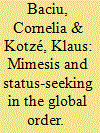

|
|
|
|
|
| Summary/Abstract |
An increasing strand of literature has been studying the dynamics of contestation of the liberal order. Holding that order emergence commences with rhetoric and narratives, this article takes stock of the BRICS summit diplomacy and contestation practices. It pursues a two-level argument. Applying BRICS as a historical case study, the article first reveals how BRICS engages in mimetic performances, re-producing parts of the global order, while simultaneously seeking a re-configuration of the current international system. Second, our analysis shows that through thin and aspiring thick recognition, BRICS countries move toward an enhanced role and status, striving for a better position in the global order. Empirically, to unpack our argument, we analyze BRICS summit diplomacy and rhetoric by unfolding the outcome declarations in the period 2009–2020, as well as BRICS performative practices.
|
|
|
|
|
|
|
|
|
|
|
|
|
|
|
|
| 7 |
ID:
187304
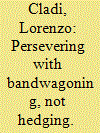

|
|
|
|
|
| Summary/Abstract |
Over the past few years, European security cooperation has been revived. The EU has launched several defence initiatives and some member states, such as France have launched their own collaborative initiatives. The renewed activism in European security cooperation followed several years of inactivity and warrants theoretical investigation. Hedging is a concept that has been employed to make sense of renewed activism in European security cooperation. By pursuing hedging, Europeans are preparing for a future in which the US might be unwilling or unable to get involved, and to assist with, European security affairs. Advancing a neorealist analysis, this article argues that European states’ efforts to increase cooperation remain consistent with the broader trajectory of European security cooperation since the end of the Cold War. European states remain dependent on the US for their security and are still far from autonomously projecting their influence internationally. This article illustrates the argument with reference to the recent withdrawal of the US from Afghanistan and the French promise to wind down its commitment in the Sahel. The implications of this argument are discussed in detail.
|
|
|
|
|
|
|
|
|
|
|
|
|
|
|
|
| 8 |
ID:
187307


|
|
|
|
|
| Summary/Abstract |
This research seeks to unpack the development of the EU as a security actor in cyberspace. Drawing on the theoretical approach of role theory, this article shows that the EU’s role in cyberspace should be understood in relationality to the other poles. On the one hand, the declining hegemonic role of the US in cyberspace as well as the divergence between the US and the EU with regard to cybersecurity governance has made the EU more aware of the need for cyber sovereignty and strategic autonomy. Therefore, the EU seeks to pursue a role of an autonomous cybersecurity player through the enactment of cybersecurity at institutional and operational level. On the other hand, under conditions of increasing interdependence, the EU has considered international cooperation to address challenges in cyberspace as a strategic priority, therefore seeking to act as a promoter of a multi-stakeholder model. Moreover, interpolariy in cyberspace determines the contestation of EU role by other poles. While the EU has recorded some small successes as a regulation-setter, emerging poles of power in the cybersecurity domain contest the EU’s desired role, promoting more state-centric approaches and seeking to transfer regulatory authority in the cybersecurity domain to the UN.
|
|
|
|
|
|
|
|
|
|
|
|
|
|
|
|
| 9 |
ID:
187303
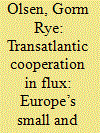

|
|
|
|
|
| Summary/Abstract |
The existing, liberal world order is under pressure and transatlantic cooperation on security is challenged. The paper raises the question, why have the European steps and policy initiatives towards addressing the new international threats and challenges to Europe been so limited and cautious. The first argument states it is because the European decision-makers were unable to agree when it came to implementing salient and concrete policies addressing new security threats and building strategic autonomy. The second argument states that the European decision-makers were only able to reach agreement on diffuse and symbolic policy ideas like building “strategic autonomy” for the European Union. The third argument states that the Europeans were able to address some of the new security challenges if it took place within NATO. The analysis shows that the European responses and reactions to the increasing tensions in the Indo-Pacific were subdued. The Europeans were unable to launch any concrete reactions to the American unilateral abrogation of the Iranian nuclear deal, to the unilateral American policy initiatives in the Israel-Palestine conflict or to the US withdrawal from Afghanistan. However, the Europeans increased the level of their defense spending and they also cooperated closely with their transatlantic partner to counter the assertive Russian foreign policy behavior.
|
|
|
|
|
|
|
|
|
|
|
|
|
|
|
|
|
|
|
|
|